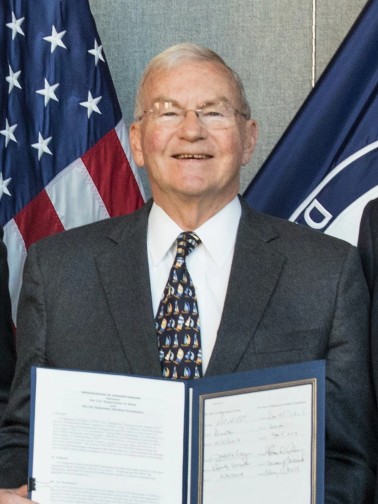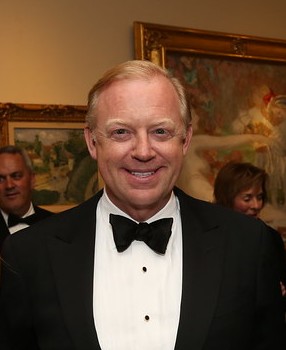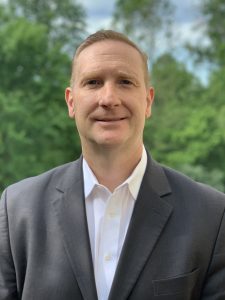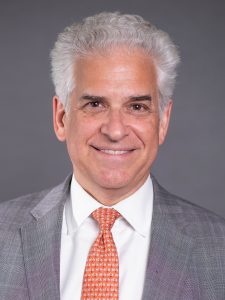On Monday, November 29, the New American Engagement Initiative hosted a virtual discussion featuring Amb. David Miller and Amb. Deborah McCarthy. The two spoke about their ideas for reinvigorating US foreign policy. They each covered topics that represent new, innovative directions for US diplomacy, including the use of big data by the State Department, aligning commercial interests with diplomatic approaches, and better communicating foreign policy goals and methods to the American people.
There is a growing gap between what Americans say their foreign policy priorities are and what US policy pursues. The Biden administration’s “Foreign Policy for the Middle Class” attempts to connect US actions abroad with the lived experiences of the American people. This Future Foreign Policy event explored how US foreign policy can deliver tangible outcomes for Americans by changing how the United States engages with the rest of the world and what issues it prioritizes.
The Future Foreign Policy series features new perspectives to expand the US toolkit to address traditional threats, confront emerging challenges, and enable greater and more robust global engagement with allies and partners. To this end, our invitees bring much-needed diversity into the national security dialogue. The speakers include not only those from traditionally underrepresented groups in Washington foreign policy circles, but also those who represent a range of viewpoints.
Featuring

Hon. David C. Miller
President, US Diplomatic Studies Foundation
Introductory remarks

Mr. George Lund
Chairman, Torch Hill Investment Partners
Moderated by
Closing remarks
Excerpt of remarks
The following are selected excerpts of the remarks provided by the speakers. They have been edited for clarity and length.
Amb. David Miller
Let me open my remarks with a short summary of our Diplomatic Studies Foundation activities and objectives. We are a think tank that thinks entirely about whether our country can do what everybody else thinks about. We write no policy papers. Essentially, we are agnostic on policy but laser-like focused on human skills and assets required to execute policy. This makes us a bit odd in the DC tradition of think tanks, as we are much closer to a “tactics shop” than a “grand strategy shop.”
What drove this? A conviction among the leadership of our foundation that over the last few decades you can argue about strategy, but we all agreed that poor execution made challenging strategic objectives even less likely to be achieved.
After some consideration of how to approach this identified shortcoming, we decided to concentrate on the education and training of State Department officers and, more broadly, the major civilian departments and agencies that develop and execute our foreign policy. We felt the best way to improve tactical performance was to improve education and training.
Second, we set out to improve education and training, making the decision to support educational innovation, both by subject and method. Frankly, this is simply learning from foundations that support virtually all our military institutions of higher education, with West Point providing a fine example.
I want to leave you two observations that have guided our work:
- Never have I seen an institution work so hard to select people, and do so little to train them after selection, as the State Department.
- And to quote the great philosopher Jim Mattis, “Bad process beats good people nine times out of ten.”
Which gets to where the work of our foundation intersects with today’s subjects: unique approaches to foreign policy; and new audiences, subjects, and methods of teaching.
We are pursuing a simple proposition. If you want to make State better at commercial diplomacy, why don’t you go to one of the hearts of commercial activity, ask them what they need and what could State do today that would be most helpful, and from that develop course work and activities that incorporate both public and private inputs. With some luck and skill, we ought to be able to design and implement dramatically improved training of use both to State and our private sector.
Leadership of the private sector is rarely found in DC and to a great extent it lives outside the Acela corridor. If you want to work with our private sector you need to get to know them and they you, which means you need to get out into the country.
The big problem is straightforward. State is rather remarkably behind many of her international civilian department and agency colleagues in terms of length of training, linking training to promotion, residential training facilities, and providing training throughout the span of a career. This is made more challenging as State has become sort of culturally hostile to training, falling back on “mentorship is the backbone of training.”
Which reverts to Jim Mattis: bad process beats good people nine times out of ten. Good officers have tried to improve FSI and State education in general. Many fine studies are on the shelf. But the truth remains that a sterile dialogue between State and the Congress, and a lack of interest by most recent Secretaries of State, has left State as an institution desperately in need of education reform.
Amb. Deborah McCarthy
I am pleased to be part of this Atlantic Council Discussion on “Reinvigorating US Diplomacy.” It is a topic which I feel strongly about and have focused on working with the Atlantic Council, up here at Harvard and at the Academy of Diplomacy.
Today, I would like to talk about four factors which I think are required to reinvigorate US diplomacy.
The first factor is shifting the National Security structure away from the War on Terrorism. Since 9/11, our military has played an enormous role in US foreign policy. Yet, as you look at current and past National Security Strategies, diplomacy is, and should be, the tool of first resort. When the last pandemic, Ebola, broke out in Liberia, it was US diplomats who negotiated the arrival of the 101st Airborne to Liberia to fight the spread of the disease. During the current pandemic, US diplomats led efforts to distribute vaccines. Diplomats, not our military lead all key negotiations to stop the spread of nuclear and chemical weapons.
Yet US diplomacy is woefully underfunded. Going forward, immediately, the Department needs more people and money to train. But let me be clear, recalibrating away from the War on Terror does not mean the end of critical partnerships between US diplomats and the US military. We have explored this relationship in 63 episodes of the podcast, “The General and The Ambassador.”
The second factor required to reinvigorate US diplomacy is the modernization of the legal framework of the US diplomatic service. By that, I mean replacing the 1980 Foreign Service Act, which is now 40 years old. While some elements should be retained, it needs some serious updating to include providing for substantially more training, much stronger requirements for diversity and, if possible, the real application of the criteria for qualification of ambassadors and other political appointees in the department.
A third factor required to reinvigorate US diplomacy is for the Department of State to up its game on strategic communication, both abroad and within the United States. The Atlantic Council’s excellent report “Upgrading US Public Diplomacy” covers many of the elements needed.
Finally, a fourth factor required to reinvigorate US diplomacy is a shift in the internal culture of the US diplomatic service. I will highlight four components.
First is the current culture of risk avoidance. Some of this is due to law: the 1986 Omnibus Act created the Accountability Review Board – whenever there is a security incident involving serious injury and loss of life, a Board is constituted. Our colleagues in the US military and in the intelligence community do not have the same restrictions. Proposals have been made and may see the light of the day in the next NDAA to change the language of the Act to have a system more akin to that in the military. This would be an important step.
Second is the current system of rewards: the rules for assignments and promotions need to be modified to bring more diversity to senior decision making and to build broader teams. The appointment of a new Chief Diversity and Inclusion Officer is an excellent first step and my colleague Ambassador Gina Abercrombie Winstanley is making significant inroads.
Third is the bias towards traditional analysis versus use of technology and big data. Every officer should be able to work with big data or to at least interpret it.
And finally, the current imbalance in preference for bilateral versus multilateral work. Simply put, others, including the Chinese, are eating our lunch in key multilateral forums, assigning their best for years at a time to these organizations. We need to do the same.
Mr. George Lund
First of all, let me thank Ambassadors Miller and McCarthy for their time and fantastic remarks today. I also want to recognize and thank Barry Pavel and Chris Preble and the other Atlantic Council leaders here, and the wider team that helped put all of this together.
And many thanks indeed to everybody who joined us today and listened to this important discussion. As Chris was just saying, I am the chair of the finance and investment committee here at the Atlantic Council, which I sometimes refer to as the Ways and Means committee. I believe that this subject today is of the greatest possible importance for the mission of the Atlantic Council. The Scowcroft Center, which is something I have been involved with from it’s very standup, works to develop sustainable, non-partisan strategies, that tackle the most critical security issues facing the United States. And in this work, we try to embody the ethos of non-partisan commitment to the cause of security and support for the US interests around the world, working in cooperation with allies and partners.
You can’t say that last line without putting the Department of State at the very center of it, it is the pivot point for everything I just said, even why the Scowcroft Center exists. I want to leave you with three summary points.
First, I have been working with Amb. David Miller for many years and we have spent many hours with a lot of colleagues, at all levels of government service and in the private sector, talking about the issue of how to elevate the work of the Department of State. Everybody agrees that the nature of their mission is of immense importance. The question is how does the institution regain its proper stature in our national posture? I look at the work (which I support, personally and financially) of the US Diplomatic Studies Foundation as a pilot program. One of the things we do fairly well in the private sector is that we get out there and see if something works. I think the ‘Peace Games’ are a tremendous example of something that demonstrates a practical way forward in Ambassadorial and FSO training, developing interagency coordination and cooperation, and driving real improvements in diplomatic strategy and tactics.
The comments of both ambassadors highlighted the importance of training. Immersion not only in the foreign culture, but also US culture, is of great significance for our diplomats. We have to start changing the current education process somewhere and we hope something like the ‘Peace Games’ can be part of that, and that this training effort can propel the State Department forward. This in turn may improve the competence of the State Department and, by extension, its standing in the nation’s strategic decision-making community.
Second, I believe Congress is central to this effort. We cannot move the Department forward without legislation. This is not a partisan issue — we’ve had Republican and Democratic administrations come through for the last forty years and US diplomacy has continued to atrophy, administration after administration after administration. Ambassador McCarthy hit on several salient examples, and until we can get the committees in Congress to start grappling with this, we’re just not going to see this thing change, and it’s hugely important to drive this home with congressional committee members.
Finally, we’ve been engaging in “limited conflicts” for decade upon decade now, and where has it left us? Thousands have died. Hundreds of Thousands have been wounded. Trillions of dollars have been spent. We have got to put diplomacy at the center of US strategy. To me, shifting the United States to diplomatically led global engagement is the great strategic challenge. It’s not China; it’s not other parts of the world. It’s within us, right here. If we cannot get America diplomatically engaged with the world, this will not end well. And the only established way we can do that is through something called the US Department of State. We have been trying it through the Department of Defense and it has not been working. The DoD has fantastic people and their role is irreplaceable, but we are engaged in a global dialogue right now on enormously important issues, and the Department of Defense is not the tool designed to do that. The tool designed to do that is the Department of State. I think this is of significance for what we are doing here at the Atlantic Council — and for the country as a whole and ultimately… for the cause of peace.


